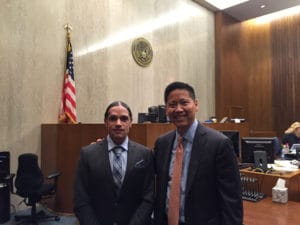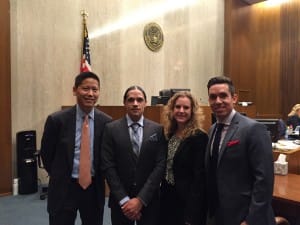by Jesse Perez
San Francisco, Dec. 13, 2015 – In what amounts to an improbable plaintiff victory, a federal jury unanimously found several Pelican Bay State Prison guards liable for retaliating against a prisoner in solitary confinement for successfully exercising his first amendment right to file a prior lawsuit against other guards. In the case, I was the prisoner plaintiff alleging that after favorably litigating a near decade‐long federal suit challenging my placement in Pelican Bay’s harsh isolation unit as a “gang associate,” the guard defendants conspired to retaliate and did retaliate against me.

The guards’ unlawful conduct, I claimed, was also spurred by my participation in peaceful civil disobedience actions that included the 2011 and 2013 California prisoners’ hunger strikes as well as my authoring articles critical of the department’s solitary housing policies and advocating for the scaling up of prisoners’ engagement in the public political process.
The retaliation at issue in the case was exacted in various forms. Specifically, I accused the guards of stripping me naked, trashing my cell, improperly taking legal documents relevant to my prior lawsuit (ongoing at the time), vocalizing threats about pursuing lawsuits against department employees and falsifying a disciplinary report with a gang nexus intended to keep me in solitary longer.
In defending against the lawsuit, the defendants – all guards assigned to the gang squad at Pelican Bay – denied the retaliatory accusations and argued that they were merely “following orders” and “standard procedures.”
On the stand, however, the factual testimony, spurious safety issues, ignorance asserted of the regulations governing their acts and rationalizations trotted in support of their defense contained gripping inconsistencies, inherent incredibility and were ultimately unpersuasive – at best.
I accused the guards of stripping me naked, trashing my cell, improperly taking legal documents relevant to my prior lawsuit (ongoing at the time), vocalizing threats about pursuing lawsuits against department employees and falsifying a disciplinary report with a gang nexus intended to keep me in solitary longer.
Following the parties’ decision to rest their respective cases, a gender‐balanced jury of eight – acting in their fact‐finding role – retreated to deliberate for two days. After considering the evidence and counsels’ arguments, the unanimous verdict returned was against several of the guard defendants.
The jury saw plenty of evidence to convince them that the guards’ actions were not the bumbling creature of ignorance and error – but, rather, the well‐designed and malicious strategy to retaliate against me for pursuing constitutionally protected legal action in court contesting my placement in isolation.

While prisons are ultimately about public safety, this case lifts the cloak of secrecy to provide a rare window for the public to see how the department’s Institutional Gang Investigators (IGI) violate the public’s trust and abuse the practice of solitary confinement in which the state continues to engage.
The large number of prisoners released from isolation since the class action Ashker v. Brown was settled also reflects the IGI’s heavy handed influence in placing and retaining prisoners there under the now discredited and empty rhetoric of safety and security.
There is also a compelling underlying truth here, I believe. What was proven at trial is necessarily emblematic of a deeper pathology existing within the California Department of Corrections and Rehabilitation, one pointing unerringly to the sheer inefficiency of the “leadership” of the agency’s administration, and the public frankly deserves better.
This is particularly so when prison officials willingly violate the constitution and refuse to remedy those violations, instead choosing to engage in protracted litigation – which only results in greater cost for taxpayers.
This alone is basis to ratchet up the tempo in the growing drum‐beat calling for substantive reforms to the state’s correctional system.
The large number of prisoners released from isolation since the class action Ashker v. Brown was settled also reflects the IGI’s heavy handed influence in placing and retaining prisoners there under the now discredited and empty rhetoric of safety and security.
The plaintiff’s prevailing case was presented at trial by the outstanding team from the WilmerHale law firm, attorneys Randall Lee, Matt Benedetto and Katie Moran. They were assisted in its preparation by Jessica Lewis and Tiffany Tejada‐Rodriguez as well as other incredible support staff that contributed to the favorable outcome.
Send our brother some love and light: Jesse Perez, K‐42186, PBSP A5-106, P.O. Box 7500, Crescent City CA 95532.





